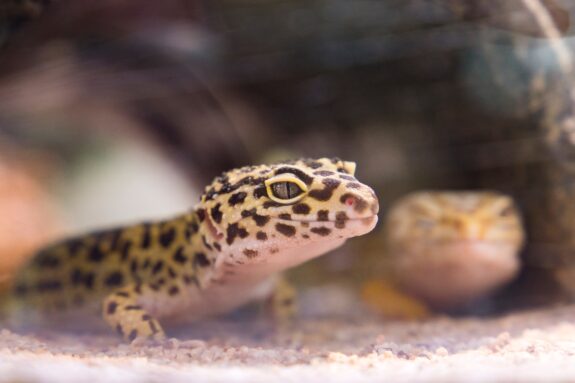
With climate change upon us it makes sense to be sure your emergency and disaster preparedness are up to par. Ideally we’d all be going through our emergency kits annually replacing batteries, and checking expiration dates, but there’s no shame in starting now. Today we’re going to assume you’ve got the basics for human emergency kits taken care of. We’re going to be focusing on Pet Emergency Kits and methods you can use to take care of your geckos in the event of a natural disaster. Of course this also applies to other emergencies where access to basic utilities and resources maybe interrupted or delayed. It can be anxiety inducing to even think about this kind of stuff but hopefully being prepared will bring you a sense of comfort instead.
Put together a pet-specific Emergency Kit
When putting together your reptile emergency kit be sure to include the following:
- large, easily identifiable tote to store everything in (labelled appropriately)
- canned food items, if possible
- dried food items stored properly to keep out pests
- chemical pocket heaters
- extra bedding
- a flashlight
- a pet first aid kit like this one from Amazon
- insulating materials like blankets, bubble wrap, etc
- bottled water (there will be a TON of variance here on how much water to keep. a good baseline minimum seems like 1 gallon per animal per week)
- veterinarian and emergency veterinarian contact information
Keep this kit next to your human emergency kit so they can both be located at the same time. Make sure everyone in the house knows where the pet emergency kit is and what is contained inside.

Keep them with you as much as possible
If your heat is cut off and your indoor temperature is dropping, you may want to consider moving into one or two essential rooms and closing off the rest of the house. If you do this, bring your geckos with you. Your body heat, concentrated in one insulated room, will be enough to keep things warmer. You can then insulate your reptile’s cage with extra blankets and bubble wrap and the like. You can’t add heat to the tank, but you can definitely keep it from cooling down faster.
Observe your geckos closely and respond quickly
Your gecko’s metabolism is going to naturally slow down a little after it’s exposed to cooler temperatures for a prolonged period. This is going to reduce its appetite. This is good if you have a limited source of food BUT you’re going to have to keep a closer eye on your reptiles because their normal routine won’t be so normal anymore. These changes are liable to throw off your gecko’s appetite and eating patterns. Watch closely to see how your animal is responding to food and water being offered. Read their body language while you do what you can to reduce their overall stress response.
If you have to evacuate
Get a supply of small deli cups with holes punched in the sides or the cover. These can be ordered in bulk from Shipyourreptiles.com. (Note that the lids need to be bought separately from the cups). Have on hand a plastic cooler that is large enough to accommodate all the deli cups you’ll need for your geckos. A canvas bag is adequate if you have only a few geckos. If you need to evacuate, place one gecko in each cup (for large collections, it’s a good idea to label the cups beforehand so you know which gecko is which) and put the cups in the cooler. Close the cooler and head off to your destination. The cooler does the double duty of keeping your geckos together and avoiding panic from the gecko-ignorant at your destination who may not appreciate someone showing up with a bunch of reptiles!

A failure to plan is a plan to fail
It doesn’t matter how many geckos you have or where you live, it’s a good idea to have some kind of emergency plan in place. For your geckos this is going to include a checklist of inhabitants and the pet emergency kit described above. Include contact information for your general veterinarian and also a few emergency veterinarians in your area.
As with all aspects of pet care this topic revolves heavily around paying close attention to your animals and responding quickly to their needs. The longer you wait, the more endangered they can become. Don’t forget to periodically check the contents of your emergency kit and add things as needed.
Do you have a pet emergency plan? What does it include? Let us know below what natural disasters you’ve experienced.



